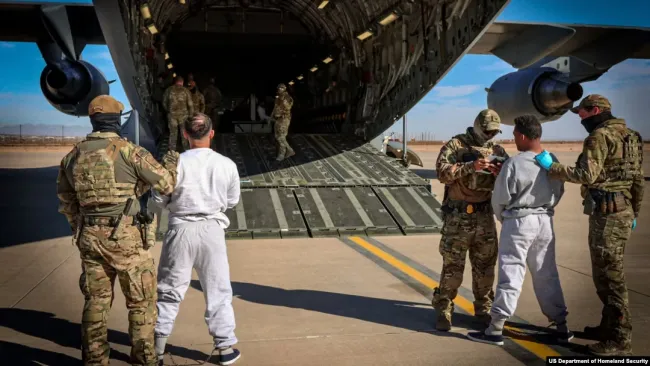Tren de Aragua: Inside Trump’s Crackdown on Latin America's Most Notorious Gang
Tren de Aragua, a violent Venezuelan gang, has expanded across the Americas, fueling crime waves from Chile to the U.S. Now, President Trump is cracking down with extreme measures—terrorist designations, Guantánamo detentions, and prison deals with El Salvador. Will these tactics dismantle the gang or spark new controversies?
Tren de Aragua (TdA), a Venezuelan criminal organization, emerged from the remnants of a failed railway project in Aragua state. Initially composed of disgruntled construction workers and prison inmates, the gang established a stronghold in Venezuela’s notorious Tocorón prison, turning it into a fortress complete with swimming pools, restaurants, and stockpiles of automatic weapons. By 2023, TdA had evolved into a transnational crime syndicate, operating across Latin America and the United States. Their activities span sex trafficking, extortion, drug smuggling, and cryptocurrency-based money laundering, preying on vulnerable migrants through debt bondage and violence.
Colombian authorities and the U.S. Treasury Department have labeled TdA one of the most disruptive criminal networks in the Western Hemisphere, with operations extending from Chile to the U.S. However, analysts argue that despite concerns over their expansion, TdA’s U.S. presence remains scattered, with no clear coordination between domestic cells.
Trump’s Crackdown: Terrorist Designation and Guantánamo Detention
On his first day in office for his second term, President Donald Trump issued an executive order designating Tren de Aragua as a Specially Designated Global Terrorist organization, grouping them alongside El Salvador’s MS-13 and Mexican cartels. This move escalated an existing crackdown initiated under the Biden administration, which had previously classified TdA as a transnational criminal group.
However, the Trump administration’s most controversial response has been the revival of Guantánamo Bay as a detention center for migrants. On February 4, 2025, the first flight carrying 10 handcuffed TdA members departed Texas for the Cuban naval base, marking the beginning of a plan to detain up to 30,000 "criminal aliens" at the facility. Homeland Security Secretary Kristi Noem called the gang members “the worst of the worst,” emphasizing Guantánamo’s role in isolating high-risk individuals.
To accommodate the influx, the Pentagon is rapidly expanding the Migrant Operations Center (MOC) at Guantánamo, deploying 300 troops and constructing temporary tent cities to hold thousands of detainees. Human rights advocates have condemned the move, citing Guantánamo’s history of abuse and its ambiguous legal status, which could deny detainees access to due process.
El Salvador’s Role: Outsourcing Incarceration
As part of a broader strategy, the Trump administration has struck a deal with El Salvador’s President Nayib Bukele to detain TdA members and even U.S. citizens convicted of crimes. Under this agreement, El Salvador’s CECOT mega-prison—already notorious for overcrowding and inhumane conditions—will house deportees and American convicts in exchange for financial compensation. Secretary of State Marco Rubio hailed the deal as “unprecedented,” but legal experts argue it violates international law by deporting U.S. citizens to a foreign prison system.
Bukele’s aggressive crackdown on gangs, which has significantly lowered El Salvador’s homicide rate, has earned him praise from Trump’s immigration hardliners. However, human rights groups continue to denounce his prisons as sites of systematic abuse, citing mass arrests and reports of inhumane treatment.
Legal, Humanitarian, and Geopolitical Consequences
- Legal Ambiguities: Trump’s use of Guantánamo bypasses traditional immigration courts, raising questions about its compliance with the 1952 Immigration and Nationality Act. The deportation of U.S. citizens to El Salvador also presents serious constitutional challenges.
- Humanitarian Concerns: Conditions at Guantánamo and CECOT are widely criticized. Reports highlight unsanitary facilities and mistreatment at the MOC, while El Salvador’s prisons lack access to clean water and basic necessities.
- Geopolitical Implications: The U.S. is leveraging alliances with authoritarian leaders like Bukele and Venezuela’s Nicolás Maduro—who recently agreed to accept deportees—to bypass traditional diplomatic obstacles.
A New Era of Immigration Enforcement?
The crackdown on Tren de Aragua reflects a broader shift toward militarized immigration policies. By combining anti-gang rhetoric with extreme measures such as offshore detention and foreign prison agreements, the Trump administration is pushing the boundaries of both domestic and international law. Supporters argue these policies are essential for national security, while critics warn they risk normalizing human rights violations.
As tent cities rise in Guantánamo and deportation flights head to El Salvador, the world watches to see whether these policies will dismantle criminal networks—or deepen cycles of violence and injustice.
